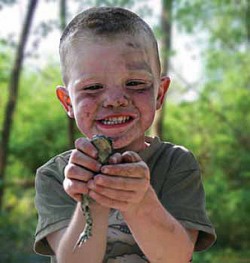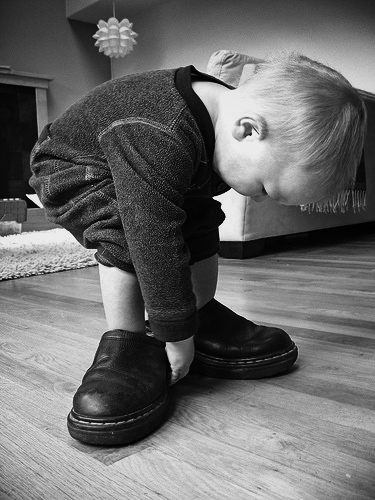When I was little, around three, I used to sit in my mom’s lap and cry about growing up.
Even at that age, I’d already figured out that being a kid was a pretty sweet gig. It was socially acceptable to pretend, all the time, and as a writer, there is nothing sweeter than being allowed to linger in the imaginary for as long as possible. Growing up meant growing out of what was comfortable, heading into the unknown.
While I love travel, changing jobs, tasting new foods, making new friends, I have been surprisingly reluctant to ever be considered an adult. I hated the rush and competition of it all—get married, buy a house, buy a bigger house, pop out spawn, show up, grind out, pass time until the next big milestone. As much as I hated it, with the exception of having kids, I played right along.
For me, the myth that a certain milestone on the calendar means I should automatically have it all, be it answers or things, has dogged me all my life.
I dreaded being grown-up so much that it left me without any real understanding of what it actually meant. It was tied solely to age and responsibility. I thought I was grown when I got married, but I was 20, and while my then-husband was a great person with a good heart and the best laugh I’ve ever heard to this day, he was no more right for me than I was for him, and our collective lack of “grown-up-ness” kept me, and him, from seeing that before we wed.
I thought I was grown when I bought my first house, and then my second, but I still believed that my happiness could be paid for, that it could be found while strolling the aisles of my neighborhood Target, stuffed between the racks at Anthropologie, rattling around in boxes containing shoes that still had their price tags, never worn.
I thought I was grown when I turned 30 in the hospital, fighting for my life as pneumonia and pleural effusion constricted my lung and choked back my ability to breathe. But, I made medical choices based on what would make my mother and estranged husband happy, instead of what would make me well. If I had been grown up, it might have gone so differently.
I thought, “You’re really a grown-up now,” the day I walked away from a courthouse, divorced for all of five minutes.
My life was in shambles around me, drowning in unending waves of medical debt caused by a six-week hospital stay and the loss of a second income to mitigate that disaster.
My ex-husband, the first boy I had ever loved, drove away without looking back, and I stood in a parking garage and wondered which instruction book or college class that I’d missed prepared you for what to do when your life plan fails, and you have to start over at the very age you thought you’d have it all.
I didn’t feel grown-up then, or any time before. I didn’t feel whatever it was that I was supposed to feel. The only thing I had to hold on to was the understanding, unglorious as it was, that I would probably handle it, whatever came next.
 Sometimes, that’s the most you can ask for.
Sometimes, that’s the most you can ask for.
I hear all the time that 30 is the new 20, that 40 is the new 30, that with each passing decade we grow-up later, a perennial adolescence that characterizes millions of people, and leaves our parents and grandparents clicking their tongues, tsk-tsk, at their terribly helpless, immature children, while they cash Social Security checks harvested from our paychecks.
I try to examine the differences between us and them, between me and my parents, to see what it is that they had I didn’t. But all I can see is an unwillingness in myself, in my generation, to settle in to the great unending ho-hum of a one-size-fits-all version of middle age.
We have become a bumper-sticker age, and the slogan is: what’s the rush?
I think older generations see a great failure when they look at the Gen X-ers and Millenials. Sometimes I secretly suspect that the older generations are the sinister cabal behind the great flood of “30 Things You Should Have Done By 30” stories, and any other number of falsely definitive lists floating across the internet these days, convincing 30 and 20-somethings that whatever they are currently doing, it’s not enough.
Secretly, I imagine these lists are a malicious plot to light a fire under kids and step-kids and grandkids who aren’t performing up to snuff. Even while I suspect them of nefarious intent, I am addicted to them. I read every single one. I keep expecting that the next one will really have the answers, but it never does. What they have is highly-styled stock photography and a bunch of clever cliches that fuel our collective inadequacy, the staples of our I-Am-Not-Enoughness.
Every time I see one of these lists as I scroll through my newsfeed, I want to tell the people I love, all of my friends, that they are too beautiful, too smart, too full of life to ever be contained in a catchy, paint-by-number list, but I never do.
I want to tell them the same thing I need to tell myself: It’s all bullshit. There isn’t a list in the world that contains all of the answers. Just like there isn’t a person, or a generation. There is no universal life plan, a one-size fits all guide to the future that, if we follow it, results in some Candyland-style ultimate destination, gumdrop-lined and drenched in the syrupy sweet assurance that everything turned out okay.
Our parents, and the people we once saw as grown-ups with all the answers were never any closer to the answers than we are now, no more sure than us of their places in the world. They were just much better at pretending than we were.
Maybe the greatest difference between our generations now and the ones before is that neither of us have ever had the answers, but we are much more willing to admit it, much more willing to say, “I don’t know.”
And maybe that’s the most grown-up thing of all.
Love elephant and want to go steady?
Sign up for our (curated) daily and weekly newsletters!
Editorial Assistant: Richard May / Editor: Catherine Monkman
Photos: katrinket; USFWS Pacific / Flickr
 Share on bsky
Share on bsky




Read 2 comments and reply